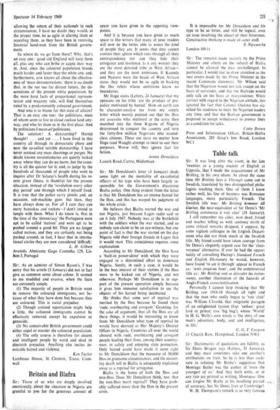Table talk
Sir: It was long after the event, in the late 'twenties as a young student of English at Uppsala, that I made the acquaintance of Mr Britling, in his own idiom. At about the same time Mr Britling Sees it Through came out in Swedish, translated by two distinguished philo- logists teaching there. One of them I knew rather well; his line of business was Romance languages, more particularly French. The Swedish title was: Mr Britling• koranter till klarhet, the near-equivalent of Sir Denis's `Mr Britling commence a voir clair' (31 January).
1 still remember my older, now dead, friend and teacher telling us with sardonic mirth of some critical remarks dropped, I suppose, by some vigilant colleague in the English Depart- ment who did not think much of the Swedish title. My friend could have taken courage from Sir Denis's elegantly argued case for the 'clair- voyance' alternative. If ever he had the oppor- tunity of consulting Harrap's Standard French and English Dictionary he would, however, have found 'to see it through' appear in French as: 'tenir jusqu'au bout'; and the controversial title as: Mr Britling voit se derouler les evene- ments, another illustration of the hazards of Anglo-French cross-fertilisation.
Personally I cannot help thinking that Mr Britling saw 1914-18 through all right and that the man who really began to `voir clair' was William Clissold, that enigmatic paragon of an enlightened tycoon (Jap. 'taikun,' great lord or prince; USA 'big bug'), whose 'World' in H. G. Wells's own words is 'the story of one man's adventure, body, soul and intelligence, in life.'
U. G. T. Ettegren 13 Church Row, Hampstead, London NW3


































 Previous page
Previous page